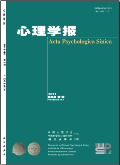心理学报2024,Vol.56Issue(9):1252-1265,中插2-中插17,30.DOI:10.3724/SP.J.1041.2024.01252
青少年亲社会行为的网络分析及核心维度
Network analysis and core dimensions of adolescent prosocial behavior
摘要
Abstract
Previous studies have discovered that the concept of prosocial behavior among adolescents is composed of four dimensions:commonweal-social rule,altruism,relationship,and personal trait.Utilizing this four-dimensional structure,the Prosocial Behavior Scale for Adolescents(PBSA)measurements revealed gender and grade-level differences in the importance attributed to each dimension.Furthermore,numerous prior studies on the development of adolescent prosocial behavior have yielded inconsistent results.In this study,we employed a network analysis approach to explore the network of adolescent prosocial behavior,uncovering the relationships among different dimensions and individual questionnaire items,revealing its core dimensions,and shedding light on differences across gender and grade. Conducted in 2017,this study included 9160 students from 15 schools spanning eight provinces or municipalities,namely Beijing,Fujian,Henan,Jiangsu,Shandong,Shaanxi,Sichuan,and Chongqing,with ages ranging from 10 to 17 and covering elementary,middle,and high school students.We utilized the PBSA,consisting of 15 items based on the four-dimensional concept,to assess and analyze the network of adolescent prosocial behavior.The network analysis process followed the standardization guidelines published by Epskamp et al,utilizing qgraph in the R programming for network estimation and computation of centrality indices.Finally,we performed comparisons of dimension networks and item networks across different genders and grades. In the overall network of adolescent prosocial behavior,as well as in the grade-and gender-based networks,the commonweal-social rule dimension consistently exhibited the highest centrality,followed by altruism,relationship,and traits dimensions.Compared to the prosocial behavior network in females,the male prosocial behavior network showed higher centrality in the commonweal-social rule and relationship dimensions,occupying more central positions within the network.When comparing prosocial behavior networks across different grades,the commonweal-social rule dimension occupied the most central position in all grades.Moreover,its centrality was highest in the middle school group.The centrality of the altruism dimension was highest in the high school group,while the relationship and personal trait dimensions held the highest centrality in the elementary school group.As for the network structure,no differences were found in the gender-based dimension networks.However,differences were identified in the grade-based dimension networks,with high school students exhibiting significantly weaker network strength than middle and elementary school students.Similarly,no notable differences were observed in the item networks based on gender,but differences were found in the item networks based on grade. Taken together,the current study has found that,in the overall sample as well as among different genders and grades,the commonweal-social rule consistently serves as a core dimension within the network structure of prosocial behavior.There were significant grade differences in both dimension networks and item prosocial behavior networks,along with subtle gender differences in item networks.These results provide a new perspective for deepening our understanding of adolescent prosocial behavior and expanding the research domain of prosocial behavior.These findings suggest that future interventions targeting the commonweal-social rule and altruism dimensions could potentially boost overall prosocial behavior in adolescents.The middle school stage may be a critical period for promoting commonweal-social rule prosocial behavior.关键词
亲社会行为/青少年/网络分析/网络比较/核心维度Key words
prosocial behavior/adolescent/network analysis/network comparison/core dimension分类
社会科学引用本文复制引用
林靓,徐博雅,杨莹,张庆鹏,寇彧..青少年亲社会行为的网络分析及核心维度[J].心理学报,2024,56(9):1252-1265,中插2-中插17,30.基金项目
北京市社会科学基金重点项目(23JYA007). (23JYA007)

